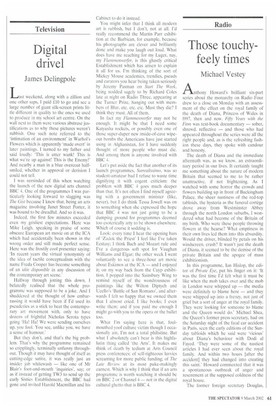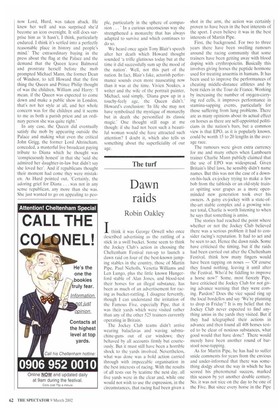Those touchy feely times
Michael Vestey
Anthony Howard's brilliant six-part series about the monarchy on Radio Four drew to a close on Monday with an assessment of the effect on the royal family of the death of Diana, Princess of Wales in 1997, then and now, Fifty Years with the Firm was text-book documentary — sober, shrewd, reflective — and those who had appeared throughout the series were all the right people and, as is the refreshing fashion these days, they spoke with candour and honesty.
The death of Diana and the immediate aftermath was, as we know, an extraordinary period in our lives. It certainly taught me something about the nature of modern Britain that seemed to me to be rather unattractive, if not frightening. As I watched with some horror the crowds and flowers building up in front of Buckingham Palace, the sheer nastiness of the red-top tabloids, the hysteria as the funeral cortege drove away from Westminster Abbey through the north London suburbs, I wondered what had become of the Britain of my birth, Who were these people throwing flowers at the hearse? What emptiness in their own lives led them into this absurdity. Would the driver, blinded by petals on his windscreen, crash? It wasn't just the death of Diana, it seemed to be the demise of the private Britain and the apogee of mass exhibitionism.
In this programme, Ian ffislop, the editor of Private Eye, put his finger on it: 'It was the first time I'd felt what it must be like when the mob takes over and the mob in London were whipped up — the media were definitely to blame here — and they were whipped up into a frenzy, not just of grief but a sort of anger at the royal family. They were looking for someone to blame and the Queen would do.' Michael Shea, the Queen's former press secretary, had on the Saturday night of the fatal car accident in Paris, seen the early editions of the Sunday tabloids which he said were 'vicious' about Diana's behaviour with Dodi al Fayed. 'They were some of the nastiest articles I had ever seen about the royal family. And within two hours [after the accident] they had changed into creating this saint.' Howard commented that it was a spontaneous outbreak of anger and resentment at the supposed coldness of the royal house.
The former foreign secretary Douglas, now Lord, Hurd, was taken aback. He knew her well and was surprised she'd become an icon overnight. It still does surprise him as 'it hasn't, I think, particularly endured, I think it's settled into a perfectly reasonable place in history and people's mind.' The extraordinary baying in the press about the flag at the Palace and the demand that the Queen leave Balmoral and prostrate herself before the mob prompted Michael Mann, the former Dean of Windsor, to tell Howard that the first thing the Queen and Prince Philip thought of was the children, William and Harry: 'I mean. if the Queen was expected to come down and make a public show in London, that's not her style at all, and her whole concern was for the children and it seems to me as both a parish priest and an ordinary person she was quite right.'
In any case, the Queen did eventually satisfy the mob by appearing outside the Palace and making what even the critical John Grigg, the former Lord Altrincham. conceded, a masterful live broadcast paying tribute to Diana which he thought was 'conspicuously honest' in that she 'said she admired her daughter-in-law but didn't say she loved her'. And if republicans thought their moment had come they were mistaken. As Hurd pointed out, 'Certainly, the adoring grief for Diana . . was not in any sense republican, any more than she was. She just wanted to go on appealing to peo
pie, particularly in the sphere of compas sion . 'In a curious unconscious way she strengthened a monarchy that has always adapted to survive and which continues to do so.
We heard once again Tony Blair's speech after her death which Howard thought sounded 'a trifle glutinous today but at the time it did successfully sum up the mood of the nation'. Well, not this part of the nation. In fact. Blair's fake, actorish performance sounds even more nauseating now than it was at the time. Vivien Noakes, a writer and the wife of the portrait painter, Michael, said simply, 'Diana grew up in a touchy-feely age, the Queen didn't.' Howard's conclusion: 'In life she may not have symbolised the mystique of monarchy but in death she personified its classic magic.' One thought still nags at me though: if she had not been such a beautiful woman would she have attracted such attention? I doubt it, which also tells us something about the superficiality of our age.















































































 Previous page
Previous page